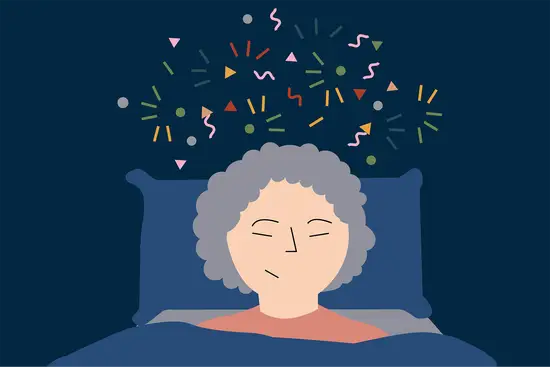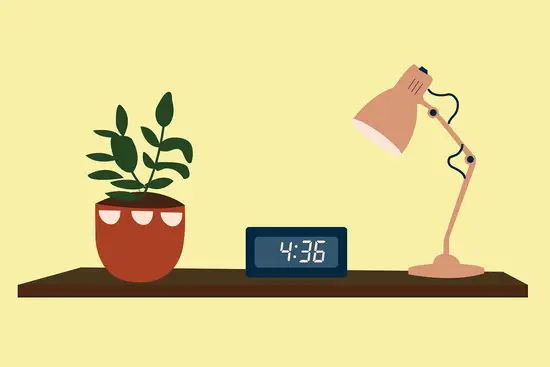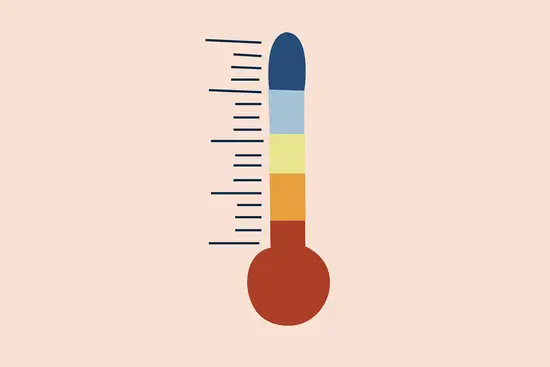Key points
Anxiety’s a natural part of our lives. If you’re stressed about an upcoming exam, appointment or job interview, that’s absolutely normal. But if you’re noticing your anxiety is having a significant impact on your life, whether during the day or night, it’s time to take some action.
It’s well-established that anxiety and how well you sleep can have major effects on each other. So if your anxiety is making it difficult to sleep or your frequent bad nights are causing you to worry even more during the day, what can you do to break this cycle?
In this article, we’ll find out. We’re going to explore:
- anxiety symptoms
- what can cause your anxiety
- the links between anxiety and your sleep
- how to stop anxiety interfering with your sleep.
Around 33% of us will experience an anxiety disorder in our lives
As we said, anxiety’s a normal part of life. It’s how our bodies naturally respond to events that are stressful. We all experience some level of anxiety from time to time, such as before an exam or job interview or during particularly stressful times.
But what exactly is anxiety? According to the NHS:
Anxiety is a feeling of unease, such as worry or fear, that can be mild or severe.1
Anxiety acts like an alert system in the body to danger, helping to prepare you to deal with whatever perceived threat is coming.
For example, imagine you have a job interview coming up. You may feel anxious about it and this feeling of anxiety lets you know you need to do something to cope with the interview. So you research the company, prepare your interview clothes, practise what you want to say.
The point is, the anxiety motivates you to do something to overcome the feeling. In this way, anxiety plays a positive role. So while some level of anxiety is normal, it becomes a problem when you find yourself feeling constantly anxious and your worries begin to get in the way of your daily life.
When anxiety is overwhelming and hard to control, it may be a sign of an anxiety disorder. Anxiety disorders are the most common mental health disorders in the general public, with around a third of people worldwide experiencing one at some point in their lives.2
Is anxiety coming between you and a good night’s sleep?
Don’t despair! Our six week sleep improvement programme is clinically-validated and has been shown to not only help people retake control of their sleep, it can also improve symptoms of anxiety. So why wait? Take the first step towards better sleep right now by answering a few short questions about your sleep.
When investigators in the UK looked at 20 years’ worth of NHS records (1998-2018) from over 6.5 million people, they found that reported rates of anxiety have increased dramatically over the last few years.3
Their study revealed a huge increase in recording of general anxiety disorder and symptoms of anxiety. The most noticeable increases were in the 18–24 and 25–34 age groups for both men and women but, overall, women had the greatest increases in anxiety rates.
Interestingly, people aged over 55 didn’t show the same dramatic increases in anxiety diagnoses over the time period investigated. A similar study from the US found that anxiety levels didn’t increase significantly in the over 50s over a ten year time-frame (2008-2018).4
This same US study saw anxiety rates rapidly increasing in younger adults too. The 18–25 age group showed the most dramatic increase in anxiety, followed by the 26-34 age group. These results are a lot like those from the NHS study.
It’s been suggested that multiple factors could be behind the dramatic rise in anxiety in younger adults. These include a greater awareness of mental health issues in this age group and also increased use of social media, which itself is highly associated with anxiety.
Global events can also affect reported anxiety in a population. We saw this during the COVID-19 pandemic when anxiety increased quite dramatically.2 5
Another reason for this rise is thought to be increased awareness and understanding of anxiety disorders by healthcare professionals. Plus the recent development of new medications, such as pregabalin, has given doctors more treatment options for people presenting with anxiety.
So there’s not one simple explanation behind why rates of anxiety seem to be rising. It’s more likely a combination of the many factors mentioned above which is also influenced by age group, gender and lifestyle.
One thing we do know without any doubt is that anxiety and sleep can affect each other.6 Poor sleep can increase anxiety, and people with anxiety often find they have trouble sleeping.
So let’s start with a quick look at how to identify anxiety, then we’ll investigate how it can affect your sleep and we’ll explore what to do if you find anxiety is coming between you and sleep.
What does anxiety look like?
Anxiety can present itself differently to each of us, but signs of anxiety can affect both your mind and your body. Symptoms can include:
- feeling tense, easily irritated, having difficulty controlling emotions
- feeling restless and finding concentrating difficult
- feeling low or depressed
- headaches, stomach aches, body pains or muscle aches
- breathing fast, feeling sweaty, dizzy or having a fast heartbeat
- feeling fatigued during the day or having problems sleeping.7 8

How are anxiety and sleep linked?
When someone experiences anxiety, it can have a knock-on effect on their sleep. Their stresses and heightened emotional state can make it harder to fall asleep and stay asleep at night.
Research has shown that sleep deprivation may increase the risk of developing an anxiety disorder.9 So it’s clear that the two are interlinked. In fact, it’s so well-established that sleep and anxiety go hand in hand that sleep disturbance is one of the defining features of several anxiety disorders.10
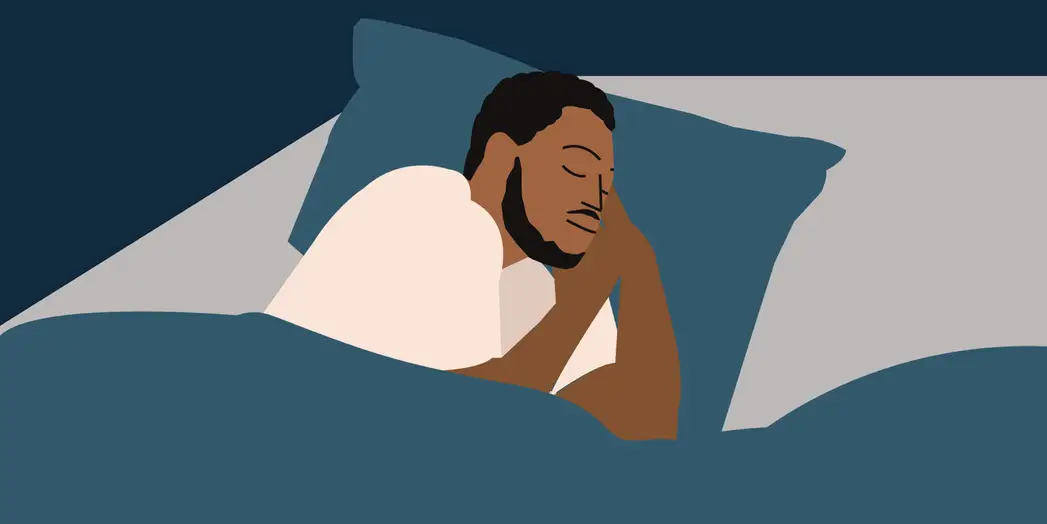
Anxiety interferes with sleep
Anxiety is believed to trigger responses in the body similar to when you experience fear. The difference is that, with fear, the threat is known (a spider, the dark, a scary movie) and with anxiety, the threat is not as simple to define.11
In response to anxiety, processes can occur in the body that are designed to help you respond to a threat. Hormones such as adrenalin and cortisol are released and your alertness, heart rate and blood pressure may increase.
Remember that job interview we were imagining earlier? Let’s picture you’re in the waiting room. You may feel anxious. You may sense that your heart rate is a bit faster than usual, have sweaty palms or feel like your belly’s churning.
These are normal biological responses to an anxious situation but once the interview is over, you’ll generally feel more relaxed as your body goes back to its normal, calmer state.
When someone is experiencing an anxiety disorder, this response is triggered when it shouldn’t be (when there is no perceived threat) and for extended periods. So you may be trying to go about your daily life with feelings that are more suited to a stressful situation.
Imagine you’re in the middle of a mundane task, vacuuming the house, folding laundry or doing a work task that’s not in itself stressful. However, your body still feels on high alert to threat and you feel all the symptoms that should be triggered by an anxious situation.
This is what happens in an anxiety disorder. The clue’s in the name: your anxiety has become dis-ordered. You’re experiencing a biological reaction that’s happening when it shouldn’t necessarily.
This can leave you in a prolonged state of high alert and it’s easy to see how this can interfere with your sleep. If you’re going to bed feeling anxious, your body and mind can remain too alert, which then doesn’t allow you to fall asleep.
Or, if you wake in the night, you may also find yourself too anxious to fall back asleep. When your sleep is being compromised like this night after night, it may develop into insomnia. Plus, poor sleep can lead to increased feelings of anxiety.
Poor sleep can affect anxiety
When you sleep badly, it can affect how you feel emotionally. Poor sleep is known to lead to feeling negative emotions more intensely and positive emotions less.
So if you’re already experiencing anxiety and your sleep is poor, it can create a cycle where poor sleep fuels your anxiety and your anxiety worsens your sleep. Quite the nightmare scenario.
But just by knowing that the two are interlinked and affect each other can be helpful to you. If you know that your poor sleep could be making you feel more anxious, the obvious solution is to try and improve your sleep.
Conversely, knowing that your anxiety could be coming between you and a good night’s sleep is a great reason to get your anxiety under control. So let’s start with looking at some ways in which to limit feelings of anxiety and boost your sleep.
How to deal with anxiety
1. Check the news less frequently
While it’s important to be aware of what’s going on in the world around you, many of us underestimate how much the news can affect our mood. It’s reported that exposure to news about traumatic events can lead to:
- increased anxiety
- heightened feelings of depression.12
To reduce the likelihood of experiencing any of the symptoms listed above, we’d recommend that you:
- limit the time you spend watching news
- check the news no more than twice a day.
When you check for information also matters. If you’re reading the news too close to your normal bedtime, there’s a risk of becoming psychologically aroused, experiencing poorer sleep and a worsening of anxiety.
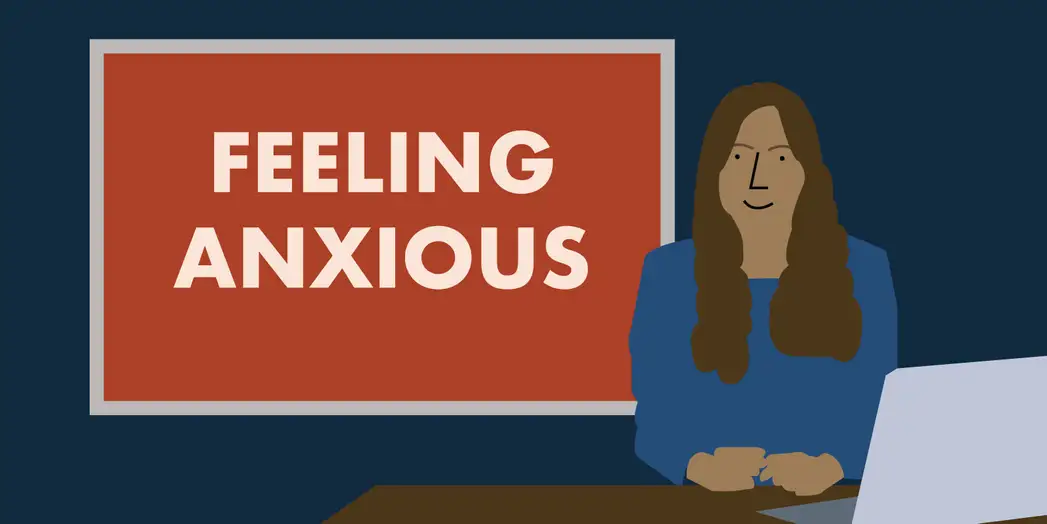
2. Avoid rumours
Social media is a great way to keep in touch with friends and family. However, a lot of information shared on social medial can be inaccurate, or just plain wrong.
If something has appeared in your feed that seems worrying, you might want to fact check it to reassure yourself. You can do this using a variety of websites, such as:
3. Tell others how you’re feeling
In addition to the above, don’t be afraid of discussing your feelings with a close friend or relative along with qualified professionals. Anxiety can feel severe, but it’s extremely treatable and discussing your feelings in this way can help immensely.
Anxiety’s also very common, so discussing your anxiety with those you trust may reveal others in your social circle who are also coping with similar feelings or can offer you their personal experience with anxiety.
There’s definitely some truth in the phrase ‘a problem shared is a problem halved’.
For those around you, letting them know that you’re experiencing anxiety may help them understand why you’ve been acting a certain way. Maybe you’ve been avoiding going out or have needed more reassurance about things from them.
4. Exercise
Exercise is a brilliant way to not only boost your mood but also help you sleep more soundly at night. When you exercise, mood enhancing chemicals (endorphins) are released by the brain and stress is released, benefitting your overall health.
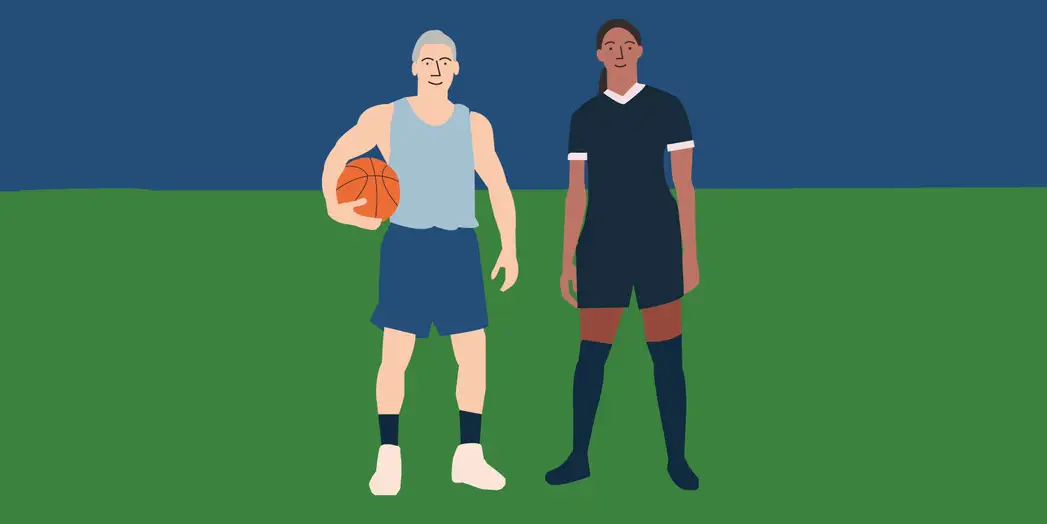
5. Pay attention to what you’re fuelling your body with
What you eat and drink can have an effect on both your anxiety and sleep. Caffeine, nicotine and alcohol can contribute to feelings of anxiety and they can all interfere with the quality of your sleep.
Similarly, when you’re eating can also impact your sleep and so can have knock on effects on your anxiety levels. Try to choose healthy meal choices and avoid heavy, fatty or overly-spicy meals close to bedtime.
Take steps to improve your sleep
Another effective way to manage anxiety is to improve your sleep. You can improve your sleep and reduce anxious feelings by:
- maintaining a consistent bed and wake time
- exercising regularly
- getting outside in the daylight each day.
We’ve already covered some of the benefits of exercise, but when it comes to sleep, getting regular exercise can help you to feel tired and ready to sleep by the time you go to bed.
Getting outside in natural light each day suppresses a key sleep hormone, melatonin, and is important for syncing your body clock to the correct time of day. Getting outside in the morning sun each day is the best way to achieve this, but any time spent outdoors will benefit you.
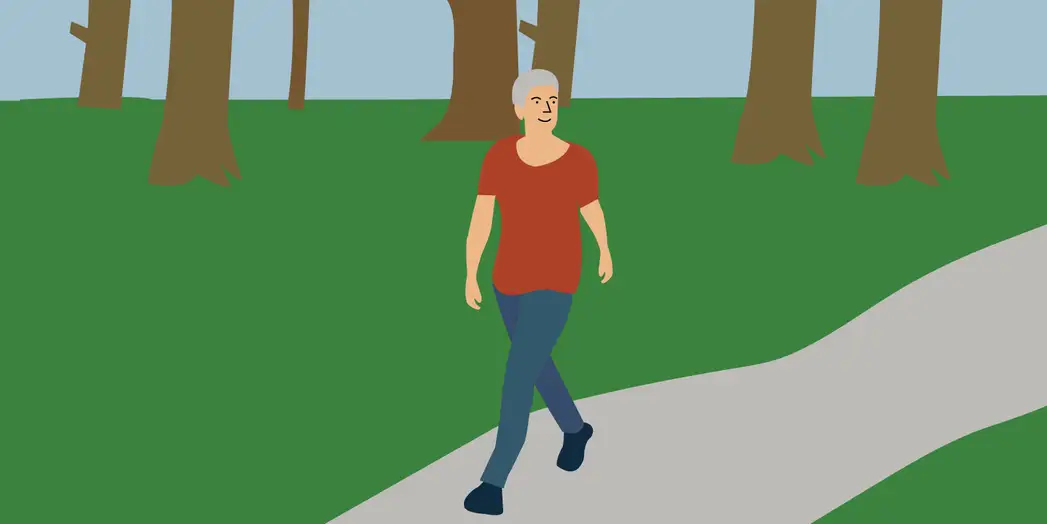
Sleep loves routine so if it’s possible for you to keep to a regular wake up time and bedtime each night, this can really help you sleep. Another thing that’s great for your sleep is to have a wind-down routine each night before you go to bed.
Just setting aside a little time to relax and unwind each evening before you sleep can help your brain to make the link between the activities in your routine (for example things like taking a bath, reading a book, sitting and meditating each night) and impending sleep time.
A common symptom of anxiety is racing thoughts that make it harder to get to sleep once you’re in bed. Although they may seem uncontrollable at times, there are a number of ways that you can distract yourself from them for a better night’s sleep.
These include forms of thought blocking such as:
- mouthing out a meaningless word while in bed
- distracting yourself by imagining a relaxing scenario
- thinking about the good things that have happened during the past day
- accepting your thoughts as they are and not trying to fight them.
If all of the above self-help tips and lifestyle advice haven’t helped you, fear not. Anxiety disorders are very treatable and there’re many treatment options available from your healthcare provider. Let’s have a look at these now.
Treatment options for anxiety disorders
Common anxiety treatment options include:
- self-help measures
- relaxation techniques
- anxiety medication
- Cognitive Behavioural Therapy (CBT).13
We’ve already discussed self-help options in the above section, including taking care of your diet, getting regular exercise and limiting your exposure to known triggers of your anxiety.
Relaxation techniques can help you to release stress and relax your muscles. Techniques using relaxation to relieve anxiety can be taught by a trained professional and take place in person, over a course of weeks or months.
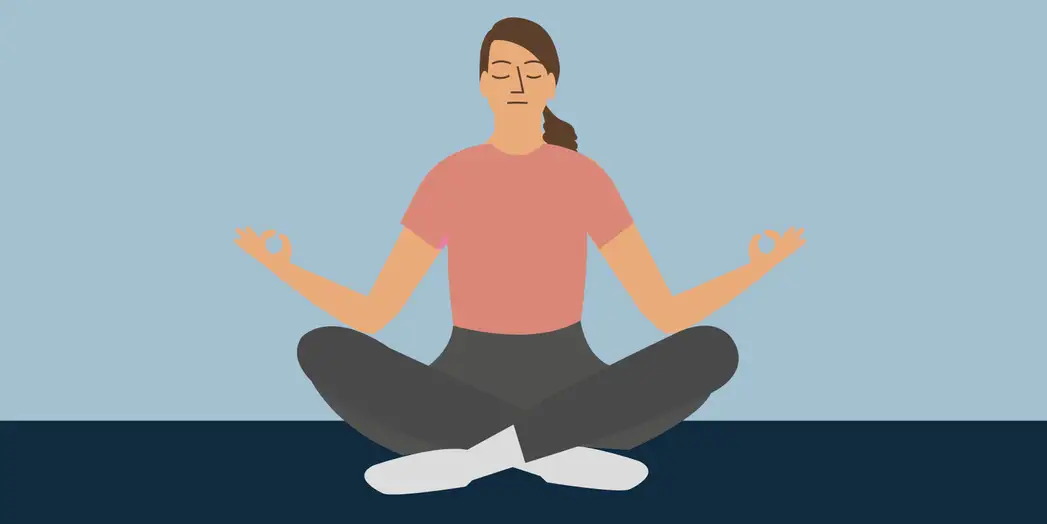
Alternatively, there’re plenty of books and online resources on relaxation techniques and how to use them. You can download apps to your smartphone or tablet that will lead you through relaxation techniques, giving you the freedom to practise and use them whenever you want.
Medication for anxiety can involve the use of antidepressants, usually in the form of a selective serotonin reuptake inhibitor (SSRI).13 These types of compounds work by increasing levels of the mood-stabilising chemical serotonin, in your brain. This can help you to feel calm.
There are other drugs that act on serotonin which may be considered to help improve your symptoms of anxiety. However, a big drawback of these types of medication is that insomnia is a common side effect.
Another drug called pregabalin can be helpful to people with generalised anxiety disorder, but it can cause daytime drowsiness. Finally, certain benzodiazepines may be given to treat severe anxiety. These are sedative drugs, which are well known for relieving symptoms of insomnia.
They can only be used in the short term though as there is a risk of addiction with long-term use and they can also cause drowsiness and other undesirable side effects.13
Cognitive Behavioural Therapy (CBT) is a drug-free option for treating anxiety and one of the most effective treatments available. CBT involves you questioning your negative thoughts and working out ways to break the cycle of anxiety.
CBT can provide long-lasting results and empowers you to take control of your anxiety and manage it. CBT can be given both face-to-face or remotely by a trained professional. There’re also downloadable apps you can try which use CBT techniques to help people with anxiety.
So it’s clear that there’re a few treatment options available to help you improve your anxiety. If anxiety has left you experiencing sleep problems or you think that sleep problems are causing you anxiety, we can help you.
Improving your sleep can help reduce anxiety
At Sleepstation’s digital sleep clinic, we’ve spent over a decade developing a range of service to help you improve your sleep, whatever the severity of your sleep problem and level of support that you need. We use CBT techniques, as mentioned above, to challenge and refocus beliefs around sleep. We use a form of CBT called Cognitive Behavioural Therapy for insomnia (CBTi) and it’s the gold standard treatment choice for treating insomnia.
Our CBTi programme is clinically-validated, highly effective and produces sustainable results. Our six week course not only gets to the root of your sleep problem, it can also help to reduce symptoms of depression, anxiety and stress.14
When you sleep well, both your mental and physical health benefit. If you want to see what other people like you have to say about how we helped them, take a look at our success stories. We’ve helped thousands of people over more than a decade and we’re here for you, too.
You’ll be supported at every step of the way by our expert team, made up of empathetic sleep coaches, experts and therapists with years of experience in helping even those with the most severe insomnia reduce their anxiety and take back control of their sleep.
So why wait? It only takes a few minutes to answer our short sleep questionnaire and you could be on the road back to better sleep in no time at all.
It’s OK to feel anxious sometimes
Everyone feels anxious from time to time, but if you feel like anxiety’s interfering with your life and your sleep, it needs to be addressed. Anxiety can make it harder for you to sleep and poor sleep can increase how anxious you feel, so it’s a vicious cycle.
Thankfully, anxiety can be treated and there’re many different treatment approaches available to you. If your anxiety is driving a wedge between you and a good night’s sleep, it’s essential that you address your sleep problem.
Prioritising your sleep is one simple step that can have a whole host of positive effects to how you feel mentally and physically. So take the first step to breaking the cycle of anxiety and poor sleep today and see how we can help you take back control of your sleep.
Summary
Anxiety is a common mental health disorder that responds very well to treatment.
- If you’re experiencing anxiety, it’s very likely you’ll experience trouble with your sleep.
- There’s a host of simple self-help approaches you can try to reduce your anxiety.
- Taking steps to improve your sleep can help reduce feelings of anxiety.
- Sleepstation can help you take back control of your sleep and get the sleep you need.
References
- Overview – Generalised anxiety disorder in adults. nhs.uk. Available here. (accessed 29 Jul 2022). ↩︎
- Bandelow B, Michaelis S. Epidemiology of anxiety disorders in the 21st century. Dialogues Clin Neurosci 2015; 17: 327–335. ↩︎
- Slee A, Nazareth I, Freemantle N, Horsfall L. Trends in generalised anxiety disorders and symptoms in primary care: UK population-based cohort study. Br J Psychiatry 2021; 218: 158–164 ↩︎
- Goodwin RD, Weinberger AH, Kim JH, Wu M, Galea S. Trends in anxiety among adults in the United States, 2008-2018: Rapid increases among young adults. J Psychiatr Res 2020; 130: 441–446. ↩︎
- COVID-19 pandemic triggers 25% increase in prevalence of anxiety and depression worldwide. Who.int. Available here. (accessed 28 Jul 2022). ↩︎
- Chellappa SL, Aeschbach D. Sleep and anxiety: From mechanisms to interventions. Sleep Med Rev 2022; 61: 101583. ↩︎
- Anxiety and panic attacks. Mind.org.uk. Available here. (accessed 28 Jul 2022). ↩︎
- Anxiety disorders. National Institute of Mental Health (NIMH). Available here. (accessed 28 Jul 2022). ↩︎
- Medic G, Wille M, Hemels ME. Short- and long-term health consequences of sleep disruption. Nat Sci Sleep 2017; 9: 151–161. ↩︎
- Staner L. Sleep and anxiety disorders. Dialogues Clin Neurosci 2003; 5: 249–258. ↩︎
- Steimer T. The biology of fear- and anxiety-related behaviors. Dialogues Clin Neurosci 2002; 4: 231–249. ↩︎
- Pfefferbaum B, Nitiéma P, Newman E. The association of mass trauma media contact with depression and anxiety: A meta-analytic review. Journal of Affective Disorders Reports 2021; 3: 100063. ↩︎
- Treatment – Generalised anxiety disorder in adults. nhs.uk. Available here. (accessed 1 Aug 2022). ↩︎
- Jansson-Fröjmark M, Jacobson K. Cognitive behavioural therapy for insomnia for patients with co-morbid generalized anxiety disorder: an open trial on clinical outcomes and putative mechanisms. Behav Cogn Psychother 2021; 49: 540–555. ↩︎
